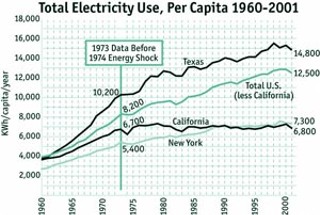Lobbying for Energy Efficiency
Coalition aims to reduce state's electricity consumption and costs through expanded utility efficiency programs
By Daniel Mottola, Fri., June 16, 2006

If scientists' stark climate change warnings aren't enough to move people toward more efficient ways of using energy, then, as costs rise, the financial drain on businesses' bottom lines and individuals' pocketbooks surely will. That's what founders of new coalition Efficiency Texas had largely on their brains, anyway. The coalition's aim is to reduce electricity consumption and costs through expanded utility efficiency programs – creating incentives and cost-recovery measures for the state's regulated, investor-owned utilities to go beyond the small amount of efficiency currently mandated. Efficiency Texas, hatched at local energy lobbying and consulting firm Good Company Associates, includes statewide environmental and business groups representing more than four million people, the managers of more than 661 million square feet of commercial space, and Texas Impact, an interfaith nonprofit. "Energy efficiency programs are a popular, cost-effective and pragmatic way to curb escalating energy demand, and with a stressed electric power grid and shrinking reserve margins, energy efficiency has never been more important," said Robert J. King, president of Good Company, in a statement.
The Texas Electric Restructuring Act (SB7) of 1999 requires investor-owned electric utilities to offer energy-efficiency programs to meet at least 10% of their annual electric load growth. But ET Director Mark Stover says utilities aren't exceeding that minimum, and their efficiency programs – such as tree-planting programs and subsidies for more efficient air conditioning and lighting – are oversubscribed and underfunded, leaving economic and environmental benefits unrealized. With more efficiency spending, like that of California and New York for example (see chart), electricity use per capita can remain flat as populations swell; efficiency spending, said Stover, can also offset the need for new power plants. Texas is poised to add 15 new coal plants, angering clean-air advocates, who say up to 50% of new energy demand can be met with increased efficiency.
Other energy policy watchdogs aren't as enthused with Efficiency Texas' plans. Carol Biedrzycki of Texas Ratepayers' Organization to Save Energy said, "All energy efficiency doesn't have equivalent benefits. The highest benefits to consumers and the environment is energy efficiency that reduces overall energy use." Biedrzycki has long been an opponent of Good Company Associates' lobbying on behalf of advanced metering technology, which uses price signals to discourage peak-time power usage, something she says merely shifts the times energy is used. Biedrzycki fears that advanced metering – as opposed to energy saving tactics like replacing appliances with high-efficiency models and building weatherization – will have too big a role with the new coalition.
Efficiency Texas has set about its work amid the high-profile Texas Public Utility Commission case against CenterPoint Energy, in which PUC staff members have alleged $105 million in overcharges to Houston-area customers in 2004. If CenterPoint is ordered to return money, ET wants it to be in the form of juiced-up efficiency programs. Stover expects to lobby other major utilities appearing before the PUC this year also. "We want the financial incentives of our regulated utilities like CenterPoint to be aligned with desires of consumers seeking the benefits of efficiency programs," he said, adding that the coalition may approach the PUC or the state Legislature in the future. "Texas leads the nation in energy use," he said. "Isn't it time for Texas to become the leader in energy efficiency?"
Got something to say on the subject? Send a letter to the editor.








